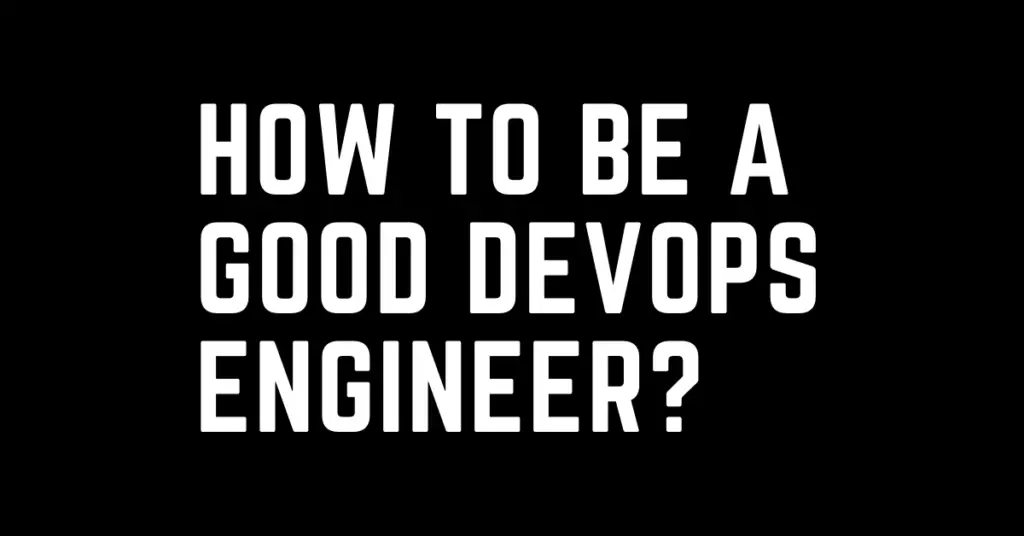Last Updated on June 3, 2025 by cscontents
Introduction
DevOps Engineer, who plays a very important role in today’s IT industry, has a very bright future. In this post, we will discuss what requires becoming a good DevOps Engineer OR How to become a good DevOps Engineer.
We know as a DevOps engineer our role can be very broad, it varies project to project, company to company. But in general, below are a few points you need to focus on.
- Scripting – bash, python, etc.
- Understanding of system design and architectural design.
- Basics of computer networking.
- Any programming language – Python is preferred.
- Master any one cloud (e.g., AWS, Azure, etc.)
As a DevOps Engineer, you should be good at Operations.
It is very significant that you are good at handling servers (e.g., virtual machines). When you work in automating infrastructure deployment, then obviously you are the person who should be aware of details about the VMs, Load Balancer, etc. Below are a few points.
-
- You should be aware of various OS. For example, if I take the Ubuntu flavor of Linux and you are deploying one application in an Ubuntu machine, then obviously you should know about the Ubuntu OS.
- You should know the fundamentals of compute resources. For example, if you are going with cloud technology, then you must be aware of Virtual Machine (VM). You should know how a VM works.
- How is VM’s hardware getting allocated? For this, you need to know hypervisor.
- How is the OS working? What image is used in that VM? For this, you should know what an image file is. An image file is nothing but OS software in a file format.
- You should know how to do a patch update in Windows, Linux, etc. Though in most cases it comes under a support task, still you should know that before moving your VMs under support, you are the person who is responsible for doing all this stuff.
You should be good at your automation skills
Automation is one of the most important responsibilities of a DevOps Engineer. As a DevOps engineer, you are here to fasten the delivery process, and automation can help here by removing those time-consuming & error-prone manual processes. If you don’t know how to automate, please start learning automation. In automation, you should learn at least the below –
- Ansible – is one of the most popular IT automation tools. You can go through this post for a better understanding of Ansible.
- PowerShell scripting – It is used to perform various task in Windows.
- Shell Scripting/Bash Scripting
DevOps Engineer needs to know basic coding
Though DevOps engineers don’t write the application code, you still need to know the logic and how the code is written. Because as a DevOps Engineer, you will be writing automation scripts in Ansible, Terraform, PowerShell, etc.
It’s always recommended to have some working experience in a developer role to become a good DevOps Engineer. You don’t need to be an expert in any programming language. But if you have the basics and a high-level understanding, then it will help you greatly.
For example, as a DevOps Engineer, you are dealing with a Java application, then it will be very helpful if you have some knowledge of Java. You should know the important points, like to run any Java application, you need JDK to be installed, Java applications are packaged as JAR files etc.
DevOps Engineer should have knowledge of networking
As a DevOps engineer, you should have a good grasp of networking. Below are a few keywords or concepts in networking you should know.
- CIDR range
- Public IP & Private IP.
- Inbound & Outbound traffic flow.
- Network Security Group
- Network Security Policy.
- Route & Route Table
- VNET or VPC and their peering (Cloud networking)
- Subnet
- Traffic routing from one hop to another hop.
DevOps Engineer should know the Bigger Picture
Last but not least, as a DevOps Engineer, try to get the bigger picture and try to gather as much information about the working of the application. For example, the information below is important if you are dealing with an application
- Detailed tech stack of the application
- Database used by the application
- Platform used by the application (e.g., VM, container)
- High-level architectural design of the system/project.
- Network traffic flows throughout the system.
Thanks
If you are interested in learning DevOps, please visit https://cscontents.com/, where we post articles related to DevOps. You can have a look at the articles below, which will help you greatly if you are in DevOps.
- Kubernetes Series: Part 1 — Introduction to Kubernetes | Background of Kubernetes
- Kubernetes Series: Part 2 — Components of Kubernetes cluster | Kubernetes cluster in detail
- Kubernetes Series: Part 3 — What is Minikube and How to create a Kubernetes cluster (on Linux) using Minikube?
- Introduction to Ansible | High-Level Understanding of Ansible
- Basics of automation using Ansible | Automate any task
- What is “Monitoring” in DevOps? Why do we need to Monitor App/DB servers, Transactions etc.?
- What is End-to-End Monitoring of any web application and Why do we need it?
- DevOps Engineer or Software Developer Engineer which is better for you?- Let’s discuss
- How to do git push, git pull, git add, git commit etc. with Bitbucket
- Network Connectivity Troubleshooting Guide for Beginners

